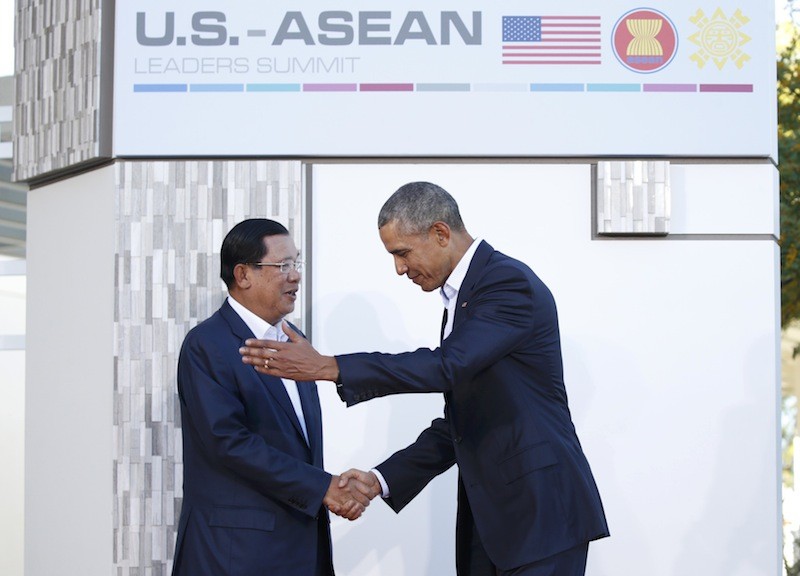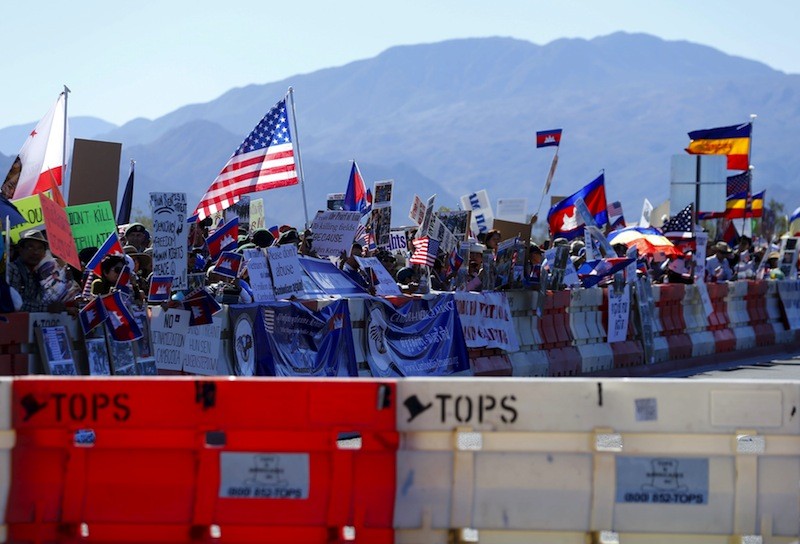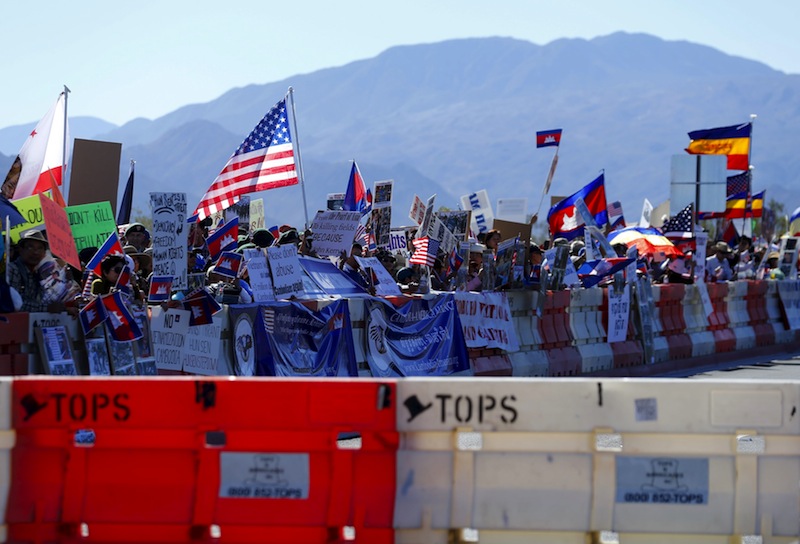With Cambodian-American protesters sequestered on a street away from the Sunnylands resort in southern California, Prime Minister Hun Sen greeted U.S. President Barack Obama and posed for a handshake free from harassment on Monday before the start of a two-day U.S.-Asean summit.
The protest, organized by the Cambodia-America Alliance, an activist group based in North Carolina, went ahead following weeks of buildup during which supporters of the ruling CPP warned of a violent response if the demonstration took place.

Despite the threats, which included allusions to the vicious beating of two opposition lawmakers outside the National Assembly in Phnom Penh in October, Tuesday’s reaction to the protest was limited, mostly due to disputes over its size.
Veasna Roeun, vice president of the Cambodia-America Alliance, said that at its peak the protest in Rancho Mirage, California, numbered more than a thousand people, most of them from Cambodian communities in the U.S. and Canada.
“We are looking at a combined total of at least 1,500,” Mr. Roeun said, adding that “a good 80 percent” were from the Cambodian diaspora, the remainder being Thai, Vietnamese, Rohingya and anti-Trans-Pacific Partnership demonstrators.
Photographs of the demonstration showed protesters standing behind barricades hoisting signs railing against Mr. Hun Sen and his government’s rights record. One read “Cambodian Lives Matter,” another “America = Democracy, Cambodia = ‘Dumb’mocracy.” Yet another read “Hun Sen is a Killer.”

“The main message is that we are fed up with the 35 years of no transparency, of 35 years of authoritarian government, of dictatorial rule,” Mr. Roeun said. “We want to see responsible government, and we don’t think we are going to get that while Hun Sen is sitting in power.”
Contradicting Mr. Roeun’s estimate of the crowd size, CPP spokesman Sok Eysan said his own sources, which he refused to name, informed him that the activist had oversold the number of Cambodian-Americans in attendance—by about 900 people.
“The information I’ve received is that they would have needed 940 more people to meet a number of 1,000 demonstrators,” Mr. Eysan said.
“This proves that they were met with failure because there were only 50 to 60 people who joined the protest,” he said, dismissing the notion that the Cambodian diaspora was generally unhappy with Mr. Hun Sen.
“The most noticeable thing was that anti-Thai government demonstrators greeted and thanked Samdech Techo Hun Sen for supporting the fight for democracy in Thailand,” he said.
Saing Song, a CPP supporter who promised on Sunday to stage counterdemonstrations against the CNRP if the Cambodian-American activists went ahead with their protest, echoed Mr. Eysan. He said the protest had been too small to warrant a response, even though he claimed to have seen CNRP activists in the crowd.

“We just saw that there were around 200 Cambodian protesters and it seemed like a very small protest,” said Mr. Song, who identified himself as leader of a group called Youth Alliance and CPP Supporters.
“Since it’s just a small protest that doesn’t have an impact on or pressure the government of Samdech Techo, we decided to call off the plan,” he said.
On Monday, Morn Phalla, head of the CNRP’s executive committee in Phnom Penh, sent a letter to municipal authorities requesting additional security, specifically citing Mr. Song’s promises of counterdemonstrations made in a Facebook post.
On Tuesday, CNRP lawmaker Ou Chanrith said his party remained on alert despite Tuesday’s calm, having seen no effort by authorities to increase security at CNRP headquarters.
With no response from the Ministry of Interior and City Hall, he said party activists had been dispatched both to deputy opposition leader Kem Sokha’s home in Tuol Kok district and to party headquarters for added protection.
“We’ll have to wait and see for a few more days and will take our precautions,” Mr. Chanrith said. “We still have to be careful.”




